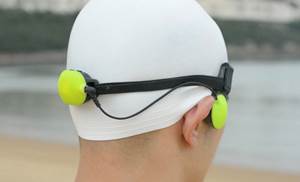



Date:29/07/16
 Triathletes and other people who are seriously into swimming typically use sports watches to track stats such as stroke numbers, lap numbers, or even their GPS coordinates when swimming outdoors. The problem with watches, though, is that users have to stop and look at them. That's why Hong Kong-based Platysens created Marlin. It's a head-worn system that delivers data verbally, via a bone conduction earpiece.
Triathletes and other people who are seriously into swimming typically use sports watches to track stats such as stroke numbers, lap numbers, or even their GPS coordinates when swimming outdoors. The problem with watches, though, is that users have to stop and look at them. That's why Hong Kong-based Platysens created Marlin. It's a head-worn system that delivers data verbally, via a bone conduction earpiece.
Marlin's waterproof main control unit attaches the user's goggle strap, at the back of the head. It's hard-wired to the earpiece, which is also attached to the strap.
When used in the pool, the device's motion sensors keep track of the user's stroke rate, lap time, lap number and total swim time – this information is delivered to them after every turn, via a synthesized voice in the earpiece. The system can also guide them through training programs, letting them know when to switch from one stroke to another.
In open water mode, it additionally uses its GPS to keep track of whether or not the swimmer is staying on course (users can enter a course beforehand, using an accompanying iOS/Android app). If they veer off-course, they'll be told.
One charge of the lithium-polymer battery should be good for up to 10 hours of use in the pool, or five hours when using the GPS feature.
Marlin is currently the subject of a Kickstarter campaign, where a pledge of US$80 will get backers a system – assuming the funding goal is met. The planned retail price is $150. A cheaper pool-only model, that lacks the GPS, is also available.
High-tech headwear speaks to you as you swim
 Triathletes and other people who are seriously into swimming typically use sports watches to track stats such as stroke numbers, lap numbers, or even their GPS coordinates when swimming outdoors. The problem with watches, though, is that users have to stop and look at them. That's why Hong Kong-based Platysens created Marlin. It's a head-worn system that delivers data verbally, via a bone conduction earpiece.
Triathletes and other people who are seriously into swimming typically use sports watches to track stats such as stroke numbers, lap numbers, or even their GPS coordinates when swimming outdoors. The problem with watches, though, is that users have to stop and look at them. That's why Hong Kong-based Platysens created Marlin. It's a head-worn system that delivers data verbally, via a bone conduction earpiece.Marlin's waterproof main control unit attaches the user's goggle strap, at the back of the head. It's hard-wired to the earpiece, which is also attached to the strap.
When used in the pool, the device's motion sensors keep track of the user's stroke rate, lap time, lap number and total swim time – this information is delivered to them after every turn, via a synthesized voice in the earpiece. The system can also guide them through training programs, letting them know when to switch from one stroke to another.
In open water mode, it additionally uses its GPS to keep track of whether or not the swimmer is staying on course (users can enter a course beforehand, using an accompanying iOS/Android app). If they veer off-course, they'll be told.
One charge of the lithium-polymer battery should be good for up to 10 hours of use in the pool, or five hours when using the GPS feature.
Marlin is currently the subject of a Kickstarter campaign, where a pledge of US$80 will get backers a system – assuming the funding goal is met. The planned retail price is $150. A cheaper pool-only model, that lacks the GPS, is also available.
Views: 444
©ictnews.az. All rights reserved.Similar news
- Azerbaijani project to monitor disease via mobile phones
- Innovative educational system to be improved under presidential decree
- NTRC prolongs license of two TV and radio organizations for 6 years
- Azerbaijan establishes e-registry for medicines
- Azerbaijani museum introduces e-guide
- Nar Mobile opens “Nar Dunyasi” sales and service center in Siyazan city
- International conference on custom electronic services held in Baku
- OIC secretary general to attend COMSTECH meeting in Baku
- Azerbaijan develops earthquake warning system
- New law to regulate transition to digital broadcasting in Azerbaijan
- Azerbaijani State Social Protection Fund introduces electronic digital signature
- Intellectual traffic management system in Baku to be commissioned in December
- Tax Ministry of Azerbaijan started receiving video-addresses
- World Bank recommends Azerbaijan to speed up e-service introduction in real estate
- Azerbaijan to shift to electronic registration of real estate





















